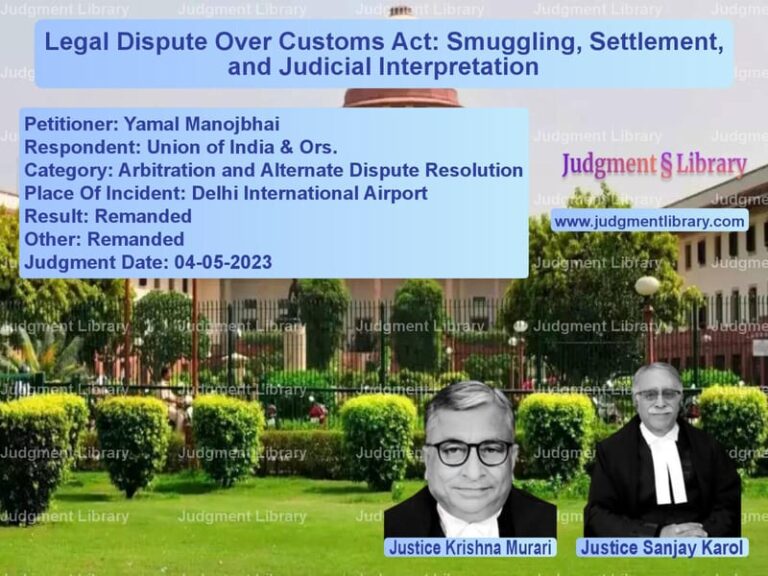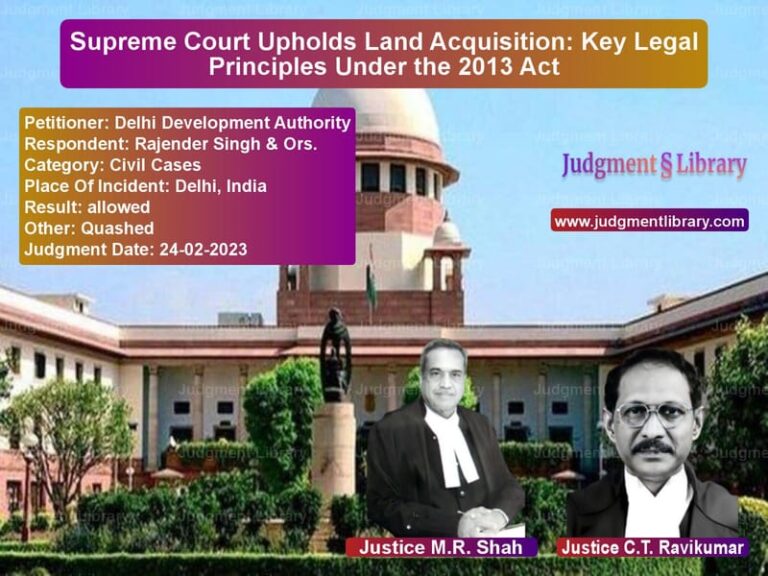Supreme Court Orders Rehearing in Dowry Death Case: A Landmark Decision on Judicial Responsibility
The Supreme Court of India, in the case of Ajay Singh & Anr. vs. State of Chhattisgarh & Anr., addressed a significant legal issue concerning judicial responsibility and procedural fairness in criminal trials. The case involved a dowry death, where the trial judge had purportedly acquitted the accused but failed to deliver a signed and reasoned judgment. The Supreme Court upheld the Chhattisgarh High Court’s decision to order a retrial, emphasizing the importance of maintaining judicial integrity.
Background of the Case
The case revolved around the tragic death of Ruby Singh, who allegedly died by suicide at her matrimonial home on December 1, 1998. Following her death, her father, Kameshwar Pratap, filed an FIR against her husband Ajay Singh, father-in-law Sureshwar Singh, mother-in-law Dhanwanti Devi, and sister-in-law Kiran Singh. The police charged the accused under Sections 304B, 498A, 328 IPC (Indian Penal Code) and Sections 3 and 4 of the Dowry Prohibition Act, 1961.
The case was tried in the Second Additional Sessions Court, Ambikapur, where the trial judge reportedly acquitted the accused. However, a subsequent complaint revealed that no judgment had been recorded, leading to an inquiry by the Chhattisgarh High Court. The High Court found that the trial judge had neither dictated nor signed any judgment, prompting it to order a retrial before a different judge.
Key Legal Issues
- Whether an acquittal could be treated as final if no signed judgment was available.
- Whether the High Court had the authority to order a retrial on the administrative side.
- Whether the procedural lapse violated the principles of natural justice.
Petitioners’ Arguments (Ajay Singh & Anr.)
- The accused argued that they had been acquitted and that the High Court could not order a retrial without an appeal by the prosecution.
- They contended that the absence of a written judgment should not invalidate their acquittal.
- The petitioners relied on precedents that limited the High Court’s administrative powers over concluded trials.
- They claimed that the High Court’s order for retrial was a violation of their right to a fair trial.
Respondents’ Arguments (State of Chhattisgarh)
- The State argued that an acquittal without a reasoned judgment could not be considered valid.
- The High Court had exercised its supervisory power under Article 227 of the Constitution to correct a gross miscarriage of justice.
- The absence of a signed judgment demonstrated judicial misconduct and required corrective action.
- The retrial was necessary to ensure procedural integrity and fairness to the victim’s family.
Supreme Court’s Observations
The Supreme Court made several crucial observations regarding judicial duty and the necessity of written judgments:
- The trial judge’s failure to deliver a signed and reasoned judgment constituted a serious procedural lapse.
- A judgment must be pronounced in open court, signed, and recorded as per the Code of Criminal Procedure (CrPC), Section 353.
- The absence of a signed judgment rendered the acquittal legally non-existent.
- The High Court had acted within its constitutional powers under Article 227 to correct the anomaly and restore faith in the judicial process.
- The retrial would not amount to double jeopardy, as the first trial had not resulted in a legally valid judgment.
Final Judgment
The Supreme Court upheld the Chhattisgarh High Court’s decision, stating:
“A trial judge must ensure that judgments are pronounced in accordance with law. An acquittal without a signed judgment cannot be recognized as a valid legal outcome.”
The Court dismissed the appeals, directing the trial to proceed before a competent Sessions Judge.
Implications of the Judgment
This judgment has far-reaching implications for judicial accountability and procedural integrity:
- It reinforces that judgments must be properly recorded and signed to be legally valid.
- The ruling affirms the High Court’s power to intervene in cases of judicial misconduct.
- It ensures that victims and their families receive a fair hearing in accordance with procedural law.
- The decision safeguards against judicial errors that could undermine public confidence in the legal system.
Conclusion
The Supreme Court’s ruling in Ajay Singh & Anr. vs. State of Chhattisgarh & Anr. underscores the importance of procedural fairness in criminal trials. By ordering a retrial, the Court has upheld the principles of justice and judicial accountability. The decision serves as a reminder that judicial officers must adhere strictly to legal requirements, ensuring that justice is both done and seen to be done.
Don’t miss out on the full details! Download the complete judgment in PDF format below and gain valuable insights instantly!
Download Judgment: Ajay Singh & Anr. vs State of Chhattisgar Supreme Court of India Judgment Dated 06-01-2017.pdf
Direct Downlaod Judgment: Direct downlaod this Judgment
See all petitions in Dowry Cases
See all petitions in Judgment by Dipak Misra
See all petitions in Judgment by Amitava Roy
See all petitions in dismissed
See all petitions in Remanded
See all petitions in supreme court of India judgments January 2017
See all petitions in 2017 judgments
See all posts in Criminal Cases Category
See all allowed petitions in Criminal Cases Category
See all Dismissed petitions in Criminal Cases Category
See all partially allowed petitions in Criminal Cases Category







